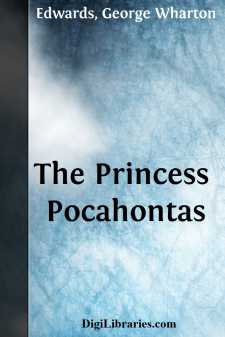Categories
- Antiques & Collectibles 13
- Architecture 36
- Art 48
- Bibles 22
- Biography & Autobiography 813
- Body, Mind & Spirit 142
- Business & Economics 28
- Children's Books 15
- Children's Fiction 12
- Computers 4
- Cooking 94
- Crafts & Hobbies 4
- Drama 346
- Education 46
- Family & Relationships 57
- Fiction 11828
- Games 19
- Gardening 17
- Health & Fitness 34
- History 1377
- House & Home 1
- Humor 147
- Juvenile Fiction 1873
- Juvenile Nonfiction 202
- Language Arts & Disciplines 88
- Law 16
- Literary Collections 686
- Literary Criticism 179
- Mathematics 13
- Medical 41
- Music 40
- Nature 179
- Non-Classifiable 1768
- Performing Arts 7
- Periodicals 1453
- Philosophy 64
- Photography 2
- Poetry 896
- Political Science 203
- Psychology 42
- Reference 154
- Religion 513
- Science 126
- Self-Help 84
- Social Science 81
- Sports & Recreation 34
- Study Aids 3
- Technology & Engineering 59
- Transportation 23
- Travel 463
- True Crime 29
The Princess Pocahontas
Categories:
Description:
Excerpt
INTRODUCTION
To most of us who have read of the early history of Virginia only in our school histories, Pocahontas is merely a figure in one dramatic scene—her rescue of John Smith. We see her in one mental picture only, kneeling beside the prostrate Englishman, her uplifted hands warding off the descending tomahawk.
By chance I began to read more about the settlement of the English at Jamestown and Pocahontas' connection with it, and the more I read the more interesting and real she grew to me. The old chronicles gave me the facts, and guided by these, my imagination began to follow the Indian maiden as she went about the forests or through the villages of the Powhatans.
We are growing up in this new country of ours. And just as when children get older they begin to feel curious about the childhood of their own parents, so we have gained a new curiosity about the early history of our country. The earlier histories and stories dealing with the Indians and the wars between them and the colonists made the red man a devil incarnate, with no redeeming virtue but that of courage. Now, however, there is a new spirit of understanding. We are finding out how often it was the Indian who was wronged and the white man who wronged him. Many records there are of treaties faithfully kept by the Indians and faithlessly broken by the colonists. Virginia was the first permanent English settlement on this continent, and if not the most important, at least equally as important to our future development as that of New England. From how small a seed, sown on that island of Jamestown in 1607, has sprung the mighty State, that herself has scattered seeds of other states and famous men and women to multiply and enrich America. And amid what dangers did this seed take root! But for one girl's aid—as far as man may judge—it would have been uprooted and destroyed.
In truth, when I look over the whole world history, I can find no other child of thirteen, boy or girl, who wielded such a far-reaching influence over the future of a nation. But for the protection and aid which Pocahontas coaxed from Powhatan for her English friends at Jamestown, the Colony would have perished from starvation or by the arrows of the hostile Indians. And the importance of this Colony to the future United States was so great that we owe to Pocahontas somewhat the same gratitude, though in a lesser degree, that France owes to her Joan of Arc.
Pocahontas's greatest service to the colonists lay not in the saving of Captain Smith's life, but in her continued succour to the starving settlement. Indeed, there are historians who have claimed that the story of her rescue of Smith is an invention without foundation. But in opposition to this view let me quote from "The American Nation: A History." Lyon Gardiner Tyler, author of the volume "England in America" says:
"The credibility of this story has been attacked.... Smith was often inaccurate and prejudiced in his statements, but that is far from saying that he deliberately mistook plain objects of sense or concocted a story having no foundation."
and from "The New International Encyclopaedia":
"Until Charles Deane attacked it (the story of Pocahontas's rescue of Smith) in 1859, it was seldom questioned, but, owing largely to his criticisms, it soon became generally discredited. In recent years, however, there has been a tendency to retain it."
It is in Smith's own writings, "General Historie of Virginia" and "A True Relation," that we find the best and fullest accounts of these first days at Jamestown. He tells us not only what happened, but how the new country looked; what kinds of game abounded; how the Indians lived, and what his impressions of their customs were. Smith was ignorant of certain facts about the Indians with which we are now familiar. The curious ceremony which took place in the hut in the forest, just before Powhatan freed Smith and allowed him to return to Jamestown, was one he could not comprehend. Modern historians believe that it was probably the ceremony of adoption by which Smith was made one of the tribe.
In many places in this story I have not only followed closely Smith's own narrative of what occurred, but have made use of the very words in which he recorded the conversations. For instance the incident related on page was set down by Smith himself; on pages , , the words are those of Smith as given in his history; on pages , , , the words of Powhatan or Pocahontas as Smith relates them.
There may be readers of this story who will want to know what became of Pocahontas. She fell ill of a fever just as she was about to sail home for Virginia and died in Gravesend, where she was buried. Her son Thomas Rolfe was educated in England and went to Virginia when he was grown. His daughter Jane married John Bolling, and among their descendants have been many famous men and women, including Edith Bolling (Mrs. Galt) who married President Woodrow Wilson.
ILLUSTRATIONS
CHAPTER I
THE RETURN OF THE WARRIORS
Through the white forest came Opechanchanough and his braves, treading as silently as the flakes that fell about them. From their girdles hung fresh scalp locks which their silent Monachan owners did not miss.
But Opechanchanough, on his way to Werowocomoco to tell The Powhatan of the victory he had won over his enemies, did not feel quite sure that he had slain all the war party against which he and his Pamunkey braves had gone forth. The unexpected snow, coming late in the winter, had been blown into their eyes by the wind so that they could not tell whether some of the Monachans had not succeeded in escaping their vengeance. Perhaps, even yet, so near to the wigwams of his brother's town, the enemy might have laid an ambush. Therefore, it behooved them to be on their guard, to look behind each tree for crouching figures and to harken with all their ears that not even a famished squirrel might crack a nut unless they could point out the bough on which it perched.
Opechanchanough led the long thin line that threaded its way through the broad cutting between huge oaks, still bronze with last year's leaves. He held his head high and to himself he framed the words of the song of triumph he meant to sing to The Powhatan, as the chief of the Powhatans was called....




